Additives Petrochemicals Hydrogen 17-07-2021 - Arhive
Additives Petrochemicals Hydrogen
-Chemical recycling subsidies harm the circular economy
According to the National Association of Plastics Recyclers and Regenerators (ASSORIMAP/CONFIMI Industria) sustainability is promoted by mechanical recycling of plastics and not by chemical recycling.
To support the development of the circular economy a strong focus on mechanical recycling of plastics is needed. We cannot agree with regulatory incentives for chemical recycling, which is a waste recovery activity that is certainly not good for the environment. In fact, these facilities would lead to unequal treatment and therefore competition between the two sectors. This is the warning issued by the National Association of Plastics Recyclers and Regenerators (ASSORIMAP/CONFIMI Industria). It is indeed necessary to pursue recycling objectives by facilitating the eco-sustainable production of goods and packaging. On the contrary, creating simplified routes for chemical recovery is anachronistic and, above all, out of step with the policies outlined by the European Union, which link sustainability to plastic recycling, identified as the true heart of the circular economy.
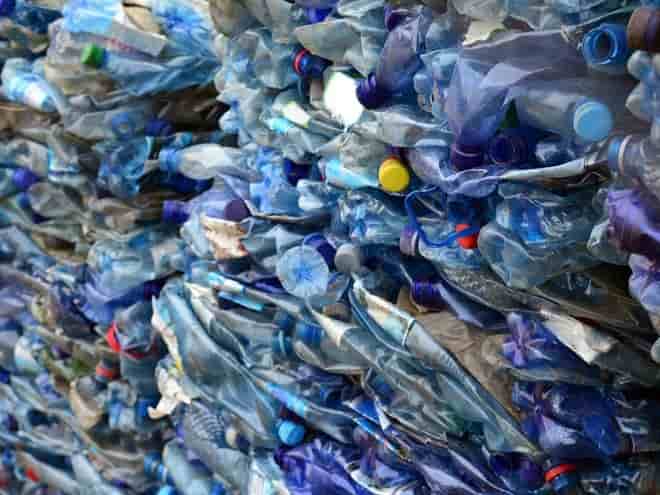
-Ethylene prices firm up in Asia
This week, ethylene prices marched higher in Asia. The price rise was supported by high upstream naphtha values and improved regional buying sentiments.
Limited product avails and stronger downstream PE pricing trends further pushed prices higher in Asia.
On Friday, CFR North East Asia ethylene prices were assessed at the USD 1000-1005/mt levels, a gain of USD (+20/mt) from last week.
CFR South East Asia prices were assessed at the USD 960-965/mt levels, a sharp week on week rise of USD (+30/mt).
In plant news, Yansab has undertaken an unplanned shutdown at its cracker, on July 11, 2021. The cracker is expected to remain shut for around 10-12 days. Located in Yanbu, Saudi Arabia, the cracker has an ethylene capacity of 1.38 million mt/year and a propylene capacity of 400,000 mt/year.
In other plant news, Lotte Chemical has shut its cracker partially on July 1, 2021 owing to a technical glitch. Further details on the duration of the shutdown could not be ascertained. Located at Yeosu, South Korea, the cracker has an ethylene capacity of 1.2 million mt/year and propylene capacity of 665,000 mt/year.
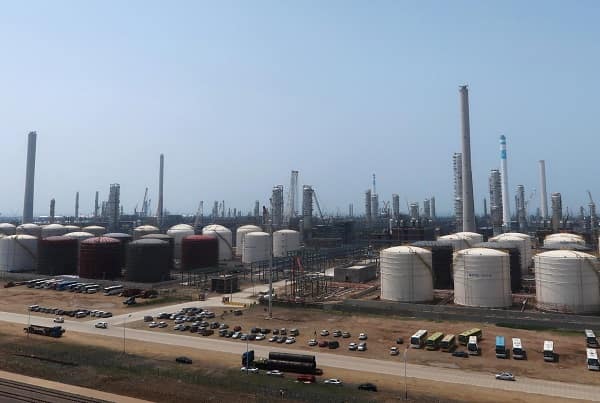
-New PE-based high-barrier food pouch designed for recyclability
Recyclability: Dow, Syntegon, Comexi, Plastchim-T & Ticinoplast collaborate
Together with a value chain team, on 15 July 2021 Dow Packaging and Specialty Plastics, a business unit of Dow announced the successful development of an innovative, polyethylene or PE-based, high-barrier food pouch, which is not only functional, but designed to enable recyclability in PE-streams. The pouches have been created together with Syntegon, Comexi, Ticinoplast and Plastchim-T.
The flexible pouches are made predominantly from a single material – PE. Mono-material pouches are easier to recycle than packaging structures available on the market today, which are made up of multiple materials, each performing a different function. Additives Petrochemicals Hydrogen
The solution that the team has been able to create enables customers to achieve the necessary functionality provided by those multiple materials – for example, oxygen and water vapor barrier, printability, toughness, stiffness, excellent gloss and clarity – without compromising recyclability.
The new PE-based material has the gloss, stiffness and machinability for printing by offset and EB curing on a Comexi press and for filling and sealing on a Syntegon VFFS machine. Image from short video Dow, Syntegon, Comexi et al
Pierre Hamelink, global account management and sustainability, vertical segment, at Syntegon, commented, “Syntegon is embracing the sustainability challenge towards a circular economy and therefore wants to collaborate with leading brands in the marketplace to offer the best solutions possible to its customers. It’s a big step forward: through this joint solution brands who need a recyclable packaging material with appropriate barrier performance for a range of dry goods, and who do not want to compromise on bag quality and machine speed, now have a tune-able option at hand.”
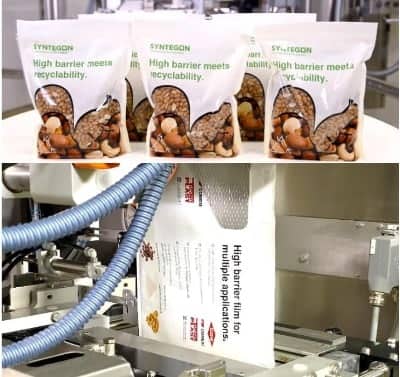
-Borouge links up with Jinhui and Plaspulp to expand recycled materials portfolio in Asia
Petrochemical firm Borouge says that it has tied up with Suzhou Jinhui Technology Materials Co., Ltd (Suzhou Jinhui) in China, as well as with Plaspulp Union Pte Ltd (Plaspulp Union) in Singapore, to advance its ambitions to become an end-to-end solutions provider of both virgin and recycled polyolefins.
With Plaspulp it is Borouge’s first foray into the recycling marketplace in Southeast Asia, and Borouge is expected to establish more partnerships with other recycling companies in the coming months. Additives Petrochemicals Hydrogen
Borouge says that with the access to Plaspulp Union’s mechanical recycling capabilities and products as well as by leveraging Suzhou Jinhui’s mechanical recycling capabilities, will enable it to access recyclates and further develop and commercialise new packaging applications that incorporate recyclates, drive sustainability and meet the rising market demand for circular packaging.
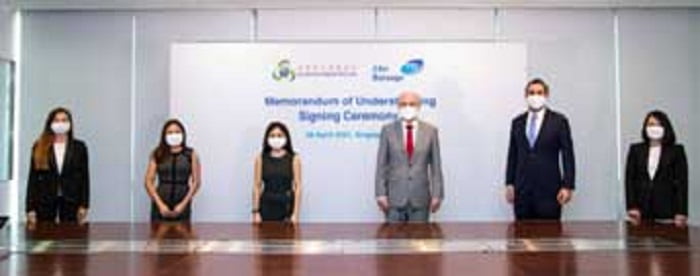
-Autoneum launches eco-friendly rPET carpets
Autoneum carpet systems already meet the highest standards of sustainable mobility due to their high content of recycled fibers. Additives Petrochemicals Hydrogen
Thanks to an alternative backcoating (ABC) process, Autoneum carpets are now becoming even more environmentally friendly: By replacing the latex commonly used in standard backcoatings with thermoplastic material, the recyclability of carpets at the end of product life is further improved. In addition, the innovative manufacturing process greatly reduces water and energy consumption and thus CO2 emissions in production.
Lightweight, textile-based carpet technologies such as Di-Light or Relive-1 significantly improve the environmental performance of carpets. For example, Di-Light-based carpets consist of up to 97% recycled PET; aside from that, they are around 20% lighter than conventional needlepunch carpets, thus contributing to lower fuel consumption and CO2 emissions from vehicles. In addition, Autoneum needlepunch carpets are now even more sustainable thanks to the innovative ABC process, which uses a thermoplastic adhesive instead of latex in the backcoating: Unlike latex, thermoplastic adhesives can be heated and melted down together with the carpet components made of pure PET at the end of the product life cycle, which facilitates recycling considerably. Furthermore, since the fibers of the thermoplastic mono-material are easier to open, carpet cut-outs can be reclaimed more easily, thereby reducing the consumption of natural resources as well as waste volumes and thus CO2 emissions. The environmental performance of Autoneum’s needlepunch carpets, which already contain a high proportion of recycled PET, is thus further improved.
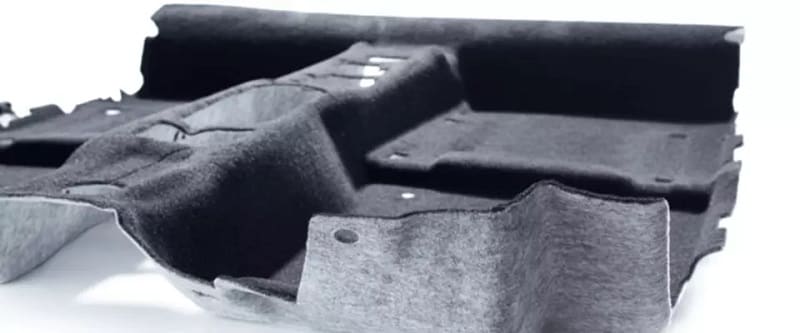
-Weaving Solution: Uster Q-Bar 2 Formation Monitoring System
What do weavers need? In a word, it’s security – for both fabric quality and profit margins. And for this double security, there’s only one solution: the Uster Q-Bar 2 formation monitoring system. It’s like having an extra operator dedicated to a single weaving machine… Additives Petrochemicals Hydrogen
Operators should be everywhere at the same time – checking, fixing, keeping the machines continuously running – no matter in which weaving mill, all around the globe. Operators should be as fast as world record sprinter Usain Bolt, see as good as an eagle and with the knowhow of an engineer and service technician for different kinds of weaving machines. As operators with this skill set are really rare it’s a matter of fact that most of them are stressed.
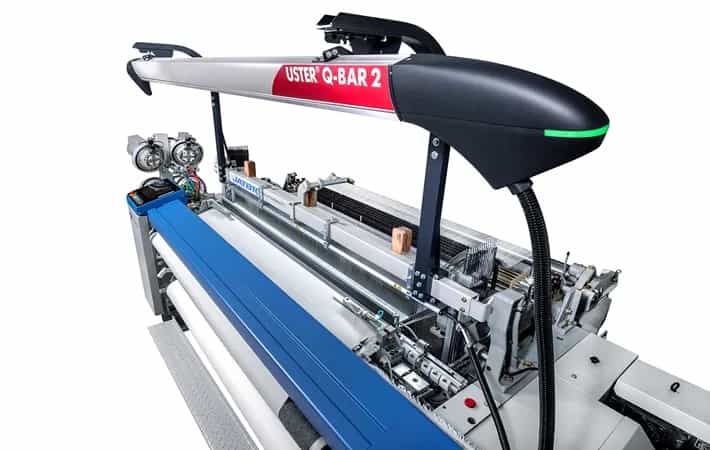
-Renewing today’s recycling system
At Eastman, we are committed to using sustainable innovation to solve some of the world’s greatest challenges. The 3R’s — reduce, reuse and recycle — aren’t working the way they should for plastic. To create a resilient, sustainable future, it’s essential that we solve the plastic waste crisis. And the current recycling practices do not adequately address plastic, a ubiquitous material in our modern world.
The good news is that the problem can be solved. With innovation in technologies and policies, and collaborations between the value chain and policymakers, plastic can become circular. Additives Petrochemicals Hydrogen
The current recycling problem
Currently, only 12 percent of the 300 million tons of plastic produced each year is successfully recycled, according to a McKinsey study. Understanding that plastic waste is a big source of pollution, more than 500 brands, governments and other organizations have committed to significantly increase their use of recycled materials. But traditional recycling, also called mechanical, alone can’t meet that kind of demand.
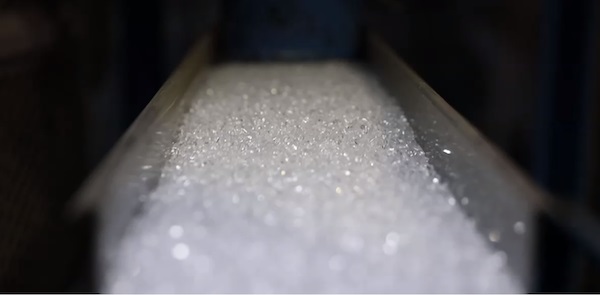
Avient announced the launch of ColorMatrix™ Lactra™ Four, One, and Zero additives. This new product range offers low total inorganic and TiO2 content light-blocking solutions for PET dairy and dairy-alternative packaging.
Food and beverage brand owners are aware of current French tariffs and potential future tariffs that may limit TiO2 content in packaging. As a result, brand owners in the EU, Asia, and LATAM are proactively reducing TiO2 and total inorganic content in their packaging to less than 4 percent, with an eye toward an expected future reduction to less than 1 percent. Additives Petrochemicals Hydrogen
The new range of Lactra additives helps to streamline this process, as they process well at similar conditions to virgin PET. These next-generation light blocking solutions also include:
- REACH compliance
- EU food contact approval
- Full light blocking (>99.8% up to 700nm) performance even in thin wall sections
To help packaging customers further their recyclability and lightweighting goals, Avient developed this technology for mono-layer PET, one of the most widely recycled packaging materials. Lactra Four, One, and Zero offer light blocking up to 99.9 percent with total inorganic content of less than 4 percent and TiO2 content between 4 and zero percent. Additional benefits include improved performance in thin wall sections, superior whiteness, and better processability with virgin PET grades and rPET.
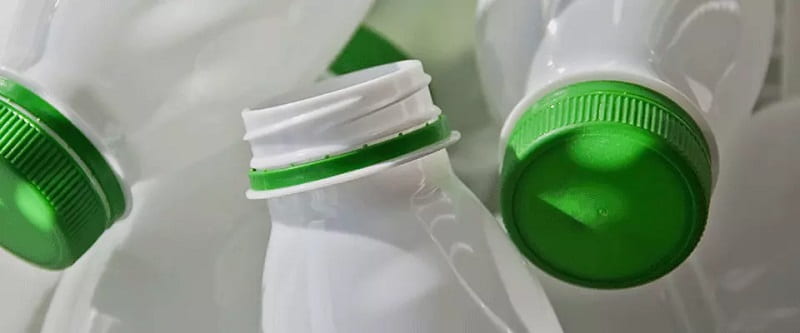
Our industry is facing an almost insoluble problem, pun intended: the complexity of the raw materials we’re handling. This holds especially true for plastic waste management
Even simple wrapping solutions to protect a product have developed into an elaborate melange of different laminations, coatings and additives in recent decades. And no other material on this planet is more difficult to differentiate – even for experts. Transparent wrapping can be polyethylene terephthalate (PET), polyvinyl chloride (PVC) or even general-purpose polystyrene (PS). But separating these plastics is key, because processing them together makes the recyclate contaminated beyond reusability. Additives Petrochemicals Hydrogen
No wonder that, given this complexity, only 2 to 5% of flexible plastic (depending on the statistics you want to believe) is currently recycled – and even this is reverse engineered only once. While flexible plastic makes up only 35% of all plastic produced, it accounts for 50% of plastic waste, according to UN statistics. Things don’t look any better on the other side of the value chain: when you talk to professionals in the packaging industry, they will tell you that prices for food-grade, high-quality recycled plastics are significantly above those of virgin materials. “There is simply no business case for recycled materials in the packaging industry,” one CEO told me at an industry meeting a couple of weeks ago. “Yet,” he added with some optimism.
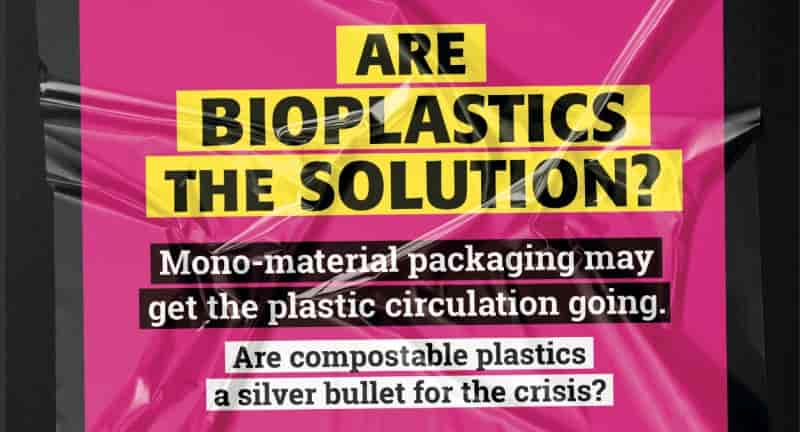
-LyondellBasell’s licenses tech to Jiangsu Fenghai complex in China
Meanwhile in other news, LyondellBasell, the world’s largest licensor of polyolefin technologies, says that Jiangsu Fenghai High-tech Materials Co., will use the LyondellBasell Spheripol and Hostalen Advanced Cascade Process (Hostalen ACP) technology for its new facility. Additives Petrochemicals Hydrogen
The process technology will be used for a 400 kilotonnes/year Spheripol and 300 kilotonnes/year Hostalen ACP plant, to be built in Lianyungang, Jiangsu, P.R. China.
“We are delighted that Jiangsu Fenghai has awarded LyondellBasell these substantial licenses for their first polyolefin project,” said Neil Nadalin, Director of Licensing at LyondellBasell. Nadalin added: “Jiangsu Fenghai’s technology selection will enable them to produce benchmark polypropylene (PP) and high-density polyethylene (HDPE) products using LyondellBasell’s Spheripol and Hostalen ACP low pressure processes. These products continue to be in high demand in China today.”

-Expansion of filters for anti-coronavirus agents
Asahi Kasei Medical is to expand production capacity for its hydrophilic PVDF (polyvinylidene fluoride) hollow-fibre membranes for Planova BioEX filters at its spinning plant in Oita, Japan.
The global Covid-19 pandemic has increased the urgent demand for Planova filters which are indispensable in developing and mass-producing anti-coronavirus agents.
Asahi Kasei Medical will now double spinning production capacity at the Oita site with the capacity increase expected to commence at the beginning of 2022.
All six existing spinning plants for Planova N, including that completed in 2019 in Miyazaki, Japan, have been operating efficiently and without any disruption to meet the increasing demand worldwide. Additives Petrochemicals Hydrogen
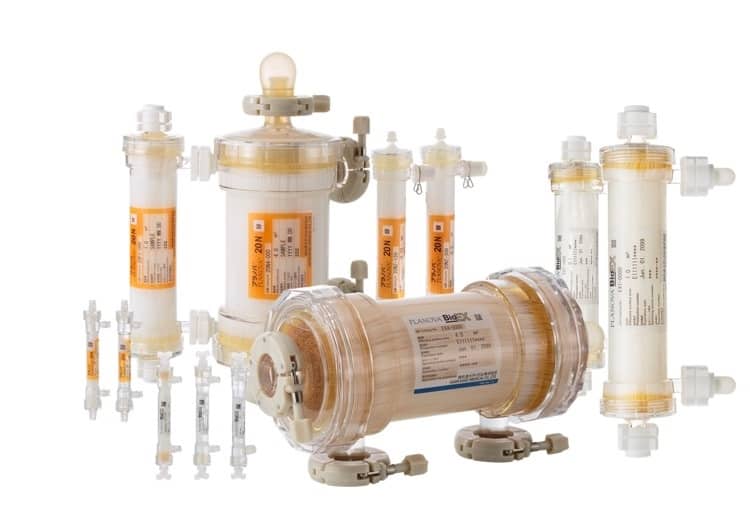
Additives Petrochemicals Hydrogen
